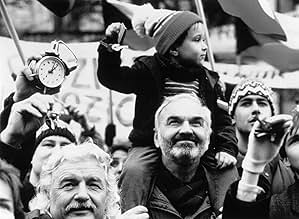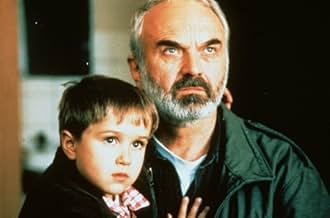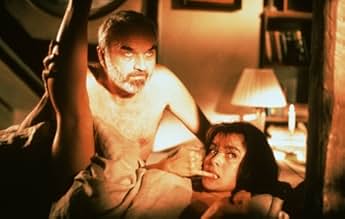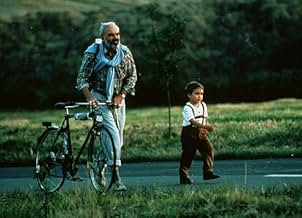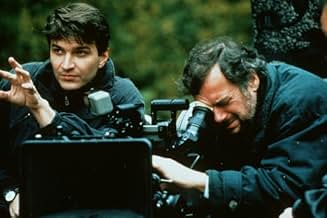CALIFICACIÓN DE IMDb
7.7/10
17 k
TU CALIFICACIÓN
Agrega una trama en tu idiomaA confirmed bachelor is in for the surprise of his life when a get-rich-quick scheme backfires and leaves him with a pint-sized new roommate.A confirmed bachelor is in for the surprise of his life when a get-rich-quick scheme backfires and leaves him with a pint-sized new roommate.A confirmed bachelor is in for the surprise of his life when a get-rich-quick scheme backfires and leaves him with a pint-sized new roommate.
- Dirección
- Guionistas
- Elenco
- Ganó 1 premio Óscar
- 21 premios ganados y 14 nominaciones en total
Zdenek Sverák
- Louka
- (as Zdeněk Svěrák)
Andrey Khalimon
- Kolja
- (as Andrej Chalimon)
Irina Bezrukova
- Nadezda
- (as Irina Livanova)
Liliyan Malkina
- Tamara
- (as Lilian Malkina)
Nela Boudová
- Brozová
- (as Nella Boudová)
- Dirección
- Guionistas
- Todo el elenco y el equipo
- Producción, taquilla y más en IMDbPro
Opiniones destacadas
Who knows what you will do when your back is against the wall? Survival makes you do some things that you would never try. In this case Louka (Zdenek Sverák), a confirmed bachelor, marries a Russian woman to get her Czech papers and to get him some money to buy a car and fix his house and pay some debts.
As soon as they marry, she heads to Germany. her son, Kolja (Andrei Chalimon), a little five-year-old, ends up with Louka, who soon finds that he is bonding with the boy.
It is a beautifully touching story with some outstanding performances by the two leads and Libuse Safránková as Klara.
It is fascinating that star and writer of the screenplay is also the father of the director. I cannot imagine how that worker, but I bet it was interesting at times.
As soon as they marry, she heads to Germany. her son, Kolja (Andrei Chalimon), a little five-year-old, ends up with Louka, who soon finds that he is bonding with the boy.
It is a beautifully touching story with some outstanding performances by the two leads and Libuse Safránková as Klara.
It is fascinating that star and writer of the screenplay is also the father of the director. I cannot imagine how that worker, but I bet it was interesting at times.
This is a variation on the theme of an older man whose emotional life is reawakened by his being thrust into unexpected parenting of a young child. Many have complained of the exploitation of such time-worn subject matter, but the worth of "Kolya" lies in the particulars of how its themes are developed. After all there are still good movies made about underdog sports teams prevailing, and even the exact same material (thinking Shakespeare here) can be made fresh through different productions.
The man in question here is Frantisek Louka, the place is the Czech Republic, and the time is 1988 (just prior to the "Velvet Revolution"). Financial constraints tempt Louka to enter into a bargain to marry a Russian woman so she can get Czech citizenship and, it turns out, escape to West Germany to be with her lover. This leaves Louka to care for the child "Kolya." One thing that makes this movie stand out is the quality of the acting by all involved. In particular Andrei Chalimon as the Russian child is very natural and will win your heart as he does Louka's. But it's a slow process.
Another thing that sets this off is the political backdrop. I knew about Russia's occupation of the Czech Republic after World War II and the non-violent overthrow of the Communist government in 1989, but that is about as far as my knowledge went. This movie portrays what it was like to live in that environment in a concrete way that a history book cannot. A lot of little scenes exemplify the underlying tensions, such as Louka's being expected to display both the Czech and Russian flags in his window, Louka's mother refusing to let some Russian soldiers in to wash their hands by lying about her having no water, and Louka's purposeful refusal to learn the Russian language. So, this movie provided a small increment in my knowledge of Czech history and that's better than nothing. How the political situation drives the action makes for a singularly interesting story.
The musical score that contains works by the Czech composers Dvořák, Suk, Fibich, and Smetana adds a special quality.
Don't be turned away from seeing this because it touches on familiar themes; it is a quality film with unique characteristics.
The man in question here is Frantisek Louka, the place is the Czech Republic, and the time is 1988 (just prior to the "Velvet Revolution"). Financial constraints tempt Louka to enter into a bargain to marry a Russian woman so she can get Czech citizenship and, it turns out, escape to West Germany to be with her lover. This leaves Louka to care for the child "Kolya." One thing that makes this movie stand out is the quality of the acting by all involved. In particular Andrei Chalimon as the Russian child is very natural and will win your heart as he does Louka's. But it's a slow process.
Another thing that sets this off is the political backdrop. I knew about Russia's occupation of the Czech Republic after World War II and the non-violent overthrow of the Communist government in 1989, but that is about as far as my knowledge went. This movie portrays what it was like to live in that environment in a concrete way that a history book cannot. A lot of little scenes exemplify the underlying tensions, such as Louka's being expected to display both the Czech and Russian flags in his window, Louka's mother refusing to let some Russian soldiers in to wash their hands by lying about her having no water, and Louka's purposeful refusal to learn the Russian language. So, this movie provided a small increment in my knowledge of Czech history and that's better than nothing. How the political situation drives the action makes for a singularly interesting story.
The musical score that contains works by the Czech composers Dvořák, Suk, Fibich, and Smetana adds a special quality.
Don't be turned away from seeing this because it touches on familiar themes; it is a quality film with unique characteristics.
I like this movie very much and I am glad to read that most of you like it too. However, some comments here describe it as predictable and having the funny parts far from one another. It is not true. There are two more things that you cannot appreciate: 1) The background. I am a Czech myself and I remember the times which the film speaks about. There are many little details that probably come and go unnoticed for the foreigner eye but each of them is a symbol - it carries meaning that is so obvious for a Czech viewer. 2) The language is FUNNY! Sverak (the author) is a well known writer here. He is a GENIUS with the language, it's full of sweet little word puns that can never be translated into another language. You can translate the data, the information - but you lose the atmosphere. Believe me, even in the parts that look boring, there is something hidden between the lines - it's either funny, emotional, powerful... There is another great thing with playing with the differences between Czech and Russian. The languages are similar (to some extend) but there are differences that can result in misunderstandings - and they use it in the movie too. Czech people used to learn Russian language at schools so they can appreciate it.
I am so sorry that there is no way that you could enjoy even these parts of the movie. (Unless you'd want to learn Czech of course :-)
Just please, please, bear in mind that this is not just a shallow romantic movie. Yes, it is lovely - but there is more than that.
I am so sorry that there is no way that you could enjoy even these parts of the movie. (Unless you'd want to learn Czech of course :-)
Just please, please, bear in mind that this is not just a shallow romantic movie. Yes, it is lovely - but there is more than that.
What is a man to do who has resisted marriage until late middle age but then enters into a fraudulent marriage of convenience and ends up solely responsible for a five year old in the bargain? That is Franta Louka's dilemma in this beautiful film.
Louka, played by Zdenek Sverak who also wrote the screenplay, is a onetime philharmonic cellist who has lost his orchestra job because the Soviet era Czech communist powers-that-be deem him unreliable. As a consequence Louka has been reduced to playing at weddings and funerals and re-gilding cemetery tombstones. He has no car and is deeply in debt. In order to finance a car and reduce his debt Louka lets a coworker from the cemetery convince him to marry a Russian woman so that she can emigrate to the West. Louka reluctantly agrees and married the woman but the Russian decamps. This ultimately results in Louka becoming solely responsible for the woman's five year old boy -- who only speaks Russian.
Louka and the little boy's relationship is both believable and moving. "Kolya" is very nearly a great film. Highly, highly recommended. 9 out of 10.
Louka, played by Zdenek Sverak who also wrote the screenplay, is a onetime philharmonic cellist who has lost his orchestra job because the Soviet era Czech communist powers-that-be deem him unreliable. As a consequence Louka has been reduced to playing at weddings and funerals and re-gilding cemetery tombstones. He has no car and is deeply in debt. In order to finance a car and reduce his debt Louka lets a coworker from the cemetery convince him to marry a Russian woman so that she can emigrate to the West. Louka reluctantly agrees and married the woman but the Russian decamps. This ultimately results in Louka becoming solely responsible for the woman's five year old boy -- who only speaks Russian.
Louka and the little boy's relationship is both believable and moving. "Kolya" is very nearly a great film. Highly, highly recommended. 9 out of 10.
10CBW-2
I did not think this film was at all sentimental (if you are using the word in its pejorative sense). In reading the comments on this film, I noticed the Czechs who responded were rather lukewarm about it. This surprises me. Kolya works as a film on several levels at once -- political, artistic, personal, etc. and I do not think it is at all predictable. The performances are magical and the entire film is encased by music of very great beauty and humanity by Dvorak and other great Czech composers. Music from Dvorak's "Four Biblical Songs" is at the heart of the film. It is the song that Klara sings at the funerals and the song Kolya is singing before and during the closing credits. The vintage film footage of Kubelik conducting Smetana's Ma Vlast at a concert at the end of the Russian occupation is a wonderful touch. Although I'm sure many other Czech films deserve Oscars, I am glad Kolya was recognized. I hope this film is released on DVD soon.
¿Sabías que…?
- TriviaThe child actor who plays Kolja, Andrey Khalimon, was not cast until three weeks before filming started.
- ErroresThroughout the movie, many background cars are clearly newer than 1989 models. The film is set in 1989.
- ConexionesFeatured in 54th Golden Globe Awards (1997)
Selecciones populares
Inicia sesión para calificar y agrega a la lista de videos para obtener recomendaciones personalizadas
- How long is Kolya?Con tecnología de Alexa
Detalles
- Fecha de lanzamiento
- Países de origen
- Sitio oficial
- Idiomas
- También se conoce como
- Kolya
- Locaciones de filmación
- Productoras
- Ver más créditos de la compañía en IMDbPro
Taquilla
- Total en EE. UU. y Canadá
- USD 5,770,254
- Total a nivel mundial
- USD 5,770,254
- Tiempo de ejecución
- 1h 51min(111 min)
- Color
- Mezcla de sonido
- Relación de aspecto
- 1.66 : 1
Contribuir a esta página
Sugiere una edición o agrega el contenido que falta


